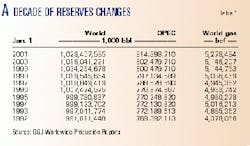World crude and natural gas reserves rebound in 2000
Click hereto view Worldwide look at reserves and production
This survey is in PDF format and will open in a new window
Worldwide reserves of crude oil and natural gas expanded in 2000. Crude oil reserves grew by 12.3 billion bbl, nearly erasing last year's decline while natural gas reserves reached an all-time high.
This slight reserves increase occurred in concert with the replacement of the 24.5 billion bbl of crude and condensate produced during the year.
Based on Oil & Gas Journal estimates gathered from an annual survey of companies and government ministries, total world reserves as of Jan. 1, 2001 are 1.028 trillion bbl of crude oil and 5.28 quadrillion cu ft of gas.
Average worldwide production of crude oil and lease condensate increased in 2000 following a dip in output last year.
Significant changes
Published reserves figures rely on changes that are reported in the OGJ survey that requests a country's proved reserves of crude and condensate as well as gas.
The most significant change in reserves that the survey revealed was for Bolivia. Current crude reserves are reported at 396.5 million bbl, up threefold from the previous estimate of 131.9 million bbl. Gas reserves are now reported at 18.3 tcf, or more than four times the previously reported estimate.
Argentina reported increases in reserves of 11.5% for crude and 9% for natural gas over last year's figures.
Thailand reported that its latest estimates put proved remaining reserves at 351.6 billion bbl of liquids, up 18% on the year, and 11.8 tcf of gas, down 5%.
The latest estimate from France has crude reserves there up to 145.17 billion bbl from 107 billion bbl.
Regional trends
Crude reserves in Western Europe experienced a large decline due to a drop in reserves in Norway but got some relief from increases in Germany and in Spain, which re-evaluated its reserves. Reserves of gas moved up 1.5% in Western Europe, led by a strong gain in Norway.
Little change appears in the total of reserves for Asia Pacific, where crude reserves are 0.1% lower and gas reserves are 0.5% higher than last published. Though small relative to other countries in Asia, gas reserves in Papua New Guinea, according to that country's Department of Petroleum & Energy, have surged 45.2% over what was previously reported.
Middle East gas reserves climbed 6%, spurred by large increases in Israel and Qatar.
OPEC reserves increased again this year, now accounting for 79.2% of world oil reserves and 44.4% of world gas reserves.
Total OPEC crude oil reserves are now estimated at 814.4 billion bbl. At the current rate of OPEC production, this would provide for 79 years of output.
North American reserves
The US Energy Information Administration reports that US reserves of oil and gas have risen 3.5% and 2.1% after dropping a year earlier. US reserves of crude now stand at 21.8 billion bbl and gas at 167.4 tcf.
Mexico reported a slight decline in crude reserves and a 1% increase in gas reserves following its 1999 re-assessment that cut the country's reserves in half. According to Pemex, proved remaining reserves are 28.26 billion bbl of crude and 30.39 tcf of gas.
Reserves of both oil and gas in Canada are reported to have dropped since the last estimates released by the Canadian Association of Petroleum Producers. Crude reserves fell 4.6% to 4.7 billion bbl while gas reserves dropped 4.5% to 61 tcf.
Production trends
OGJ estimates that world oil production climbed 3.7% this year to 67.1 million b/d following a 2% decline in 1999.
Much of the increase in 2000 production is attributed to OPEC, which boosted output an estimated 5.8% over the 1999 level.
A production increase of 2.7% is estimated for Asia-Pacific, 5.9% for the Middle East, and 6.8% for Eastern Europe and the Former Soviet Union.
US crude production is estimated to have dropped another 1% in 2000 to average 5.8 million b/d. US output of crude has dropped every year since 1991, when production averaged 7.4 million b/d.
Production of crude is estimated to have increased this year 5.1% in Canada, 5% in Mexico, and 8.9% in Venezuela.

